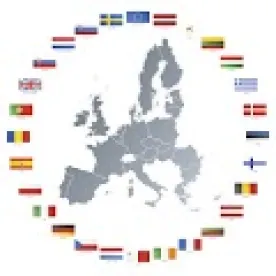Amid the tense situation between Israel and Palestinians, the United States (US) Government announced new sanctions related to the Nord Stream 2 pipeline, while waiving sanctions for an involved German company and its tops officials. Bipartisan US lawmakers chastised the Biden Administration over this move, saying the Administration weakened US efforts to counter Russian aggression in Europe. At the start of the week, the Biden Administration and European Union (EU) announced a pause on increased Section 232 steel and aluminum retaliatory tariffs, as the two sides work to address overcapacity issues with these metals. Meanwhile, the US also focused on the Arctic Council this week, where Russia assumed the chair.
The European Parliament moved this week to freeze ratification of the EU-China Comprehensive Investment Agreement, as the bloc seeks to re-balance its relationship with the People’s Republic of China (“China”). The United Kingdom (UK) and EU also continued to discuss a path forward to resolving trade concerns along the Irish Sea border.
In this issue, we also cover:
-
COVID-19 highlights among the transatlantic partners;
-
Notable UK, US, and EU developments;
-
UK-EU trade deal updates; and
-
Sanctions developments.
COVID-19 Highlights | EU, US, UK
On Thursday, EU co-legislators agreed on a common format for the EU Digital COVID Certificate, which will be used across Member States as a travel pass during the pandemic, as more countries lift restrictions. Further to the final procedural steps for the formal adoption of the legislation, the scheme will be in place for 12 months and will cover in a digital format information on the COVID-19 vaccination, test and recovery.
Responding to growing international pressure in favor of a TRIPS Agreement waiver for COVID-19 vaccines, Executive Vice-President and Trade Commissioner Valdis Dombrovskis said before the European Parliament this week that the EU plans to present a proposal to the World Trade Organization soon. The proposal is likely to focus on trade facilitation, export restrictions, expansion of production as well as clarification and facilitation of compulsory licenses.
Despite the US Centers for Disease Control and Prevention’s (CDC) easing of restrictions for fully vaccinated persons last week, the guidance has confused US states, businesses and citizens. For example, some businesses are struggling with how to verify the vaccination status of patrons. In other situations, some US states are maintaining stricter restrictions, despite the CDC’s latest guidance; and other US states have eased restrictions significantly and have seen increased business activity for their economies. Acknowledging the confusion, CDC Director Dr. Rochelle Walensky implied it relies “a lot” on trust. On 17 May, US President Joe Biden announced the United States would donate 80 million US vaccines – the 60 million doses of AstraZeneca vaccines previously announced and at least an additional 20 million doses of US authorized vaccines by the end of June – to other countries in need.
On 21 May, UK Prime Minister Boris Johnson announced a plan for a new “Global Pandemic Radar” to identify and track new COVID variants and emerging diseases. Ahead of the Group of Seven Leaders Summit in June, Prime Minister Johnson coordinated with the World Health Organization and Wellcome Trust on the plan. The WHO will lead an implementation group, supported by the Wellcome Trust, to launch this new international partnership to identify, track and share data on new coronavirus variants and monitor vaccine resistance in populations. The Prime Minister first called for a global network of disease surveillance centres as part of “5 point plan” at the UN Security Council last September. The UK Government will also convene a virtual Global Vaccine Confidence Summit on 2 June to bring together experts in the public and private sector.
Notable UK Developments
The UK Government announced on 20 May 2021, a new tariff suspension scheme, which aims to boost UK competitiveness by enabling companies to apply for a suspension of tariffs on their imported manufacturing goods. The Government introduced an online toolkit that can help companies identify current tariff suspensions. This scheme is expected to be particularly beneficial for sectors using raw materials, such as agriculture, micro electronics and chemicals. In recognition of the challenges related to the COVID-19 pandemic, existing duty suspensions that the UK Government rolled over from the EU will be extended beyond 31 December 2021 to ensure business certainty.
On 18 May, the UK Department for International Trade announced it would soon begin negotiations for upgraded trade deals with Canada and Mexico, focused on creating even greater digital, data and services opportunities for UK businesses. A call for input will solicit comments from the public, businesses and other stakeholders on what the UK’s ambitions should be for these free trade agreements.
Notable US Developments
Russia assumed the two-year rotating chair of the Arctic Council on Thursday. The US rallied other members to oppose Moscow’s plans to set maritime rules in the Northern Sea Route. While in Iceland for a meeting of Foreign Ministers, US Secretary of State Antony Blinken called for the Arctic Circle to maintain its focus on peaceful cooperation on environmental issues, maritime safety and sustainable economic development that benefits all people of the region, including indigenous people. The Ministers signed a 2021 joint declaration reaffirming the Council’s commitment to maintain peace, stability, and constructive cooperation in the Arctic region.
On the margins of the Arctic Council, Secretary Blinken met with foreign counterparts from Sweden, Norway, Finland, and Canada. In his meeting with Russian Foreign Minister Sergey Lavrov, Secretary Blinken said “the United States sought a more stable and predictable relationship with Moscow.” Secretary Blinken’s trip also included stops in Denmark and Greenland.
In a report to Congress, pursuant to the Protecting Europe’s Energy Security Act (PEESA), the US Department of State reflected four vessels, five entities, and one individual involved in construction of the Nord Stream 2 pipeline from Russia to Germany, including Nord Stream 2 AG (“NS2 AG”) and the company’s CEO Matthias Warnig. However, State added the Biden Administration decided to waive sanctions against CEO Matthias Warnig, and Nord Stream 2 AG’s corporate officers, while imposing sanctions on eight Russian ships supporting the pipeline’s construction.
Not surprisingly, Republican lawmakers were vocal in criticizing the Biden Administration’s delay in issuing the report and the sanctions waiver decision. Senate Foreign Relations Committee (SFRC) Ranking Member James Risch (R-Idaho) stated,
This move contradicts everything that President Biden and Secretary Blinken have previously said about Nord Stream 2’s malign influence, and is a gift to [Russian President Vladimir] Putin that will only weaken the United States’ leverage in the lead up to the impending Biden-Putin summit. The administration is prioritizing perceived German and Russian interests over those of our allies in Central, Eastern, and Northern Europe.”
House Foreign Affairs Committee Ranking Member Michael McCaul (R-Texas) said,
Today’s irresponsible decision by President Biden – which has been applauded by the Putin regime – clears the way for the Kremlin to complete the Nord Stream 2 pipeline. Not only did the administration fail to implement sanctions on numerous entities who are working to complete this Russian malign influence project, but they made the absolutely ridiculous claim that recklessly waiving sanctions on Russian Gazprom subsidiary Nord Stream 2 AG, its CEO – a well-known Putin crony Matthias Warnig – and its corporate officers is somehow in the U.S. ‘national interest.’”
Democratic lawmakers also criticized the Administration’s decision. SFRC Chairman Robert Menendez (D-New Jersey) issued a strongly worded statement:
I am opposed to the decision by the Biden Administration to waive sanctions on NS2 AG and Matthias Warnig. I urge the administration to rip off the Band-Aid, lift these waivers and move forward with the congressionally mandated sanctions. The administration has said that the pipeline is a bad idea and that it is a Russian malign influence project. I share that sentiment, but fail to see how today’s decision will advance U.S. efforts to counter Russian aggression in Europe.”
He added,
If the administration maintains these waivers, I have several questions. First, what does the administration now expect from Germany after having made this significant concession to exercise the waiver? Will Berlin strengthen its support for Ukraine in the Normandy Format? Will it provide additional assistance to Kyiv in its struggle against Russian aggression? Also, what will the administration do to bolster our relationship with Ukraine?”
Senator Jeanne Shaheen (D-New Hampshire) – a senior SFRC member – added,
I’m disappointed the administration will not hold Nord Stream 2 AG to the same standard. Completion of this pipeline poses a threat to U.S. security interests and the stability of our partners in the region. The administration should uphold its commitment to Congress. Every option available to prevent its completion should be utilized.”
Senator Shaheen co-authored Nord Stream 2-related bipartisan legislation designed to halt construction of the pipeline that was signed into law in 2019 as part of the Fiscal Year 2020 National Defense Authorization Act. Next Monday, the SFRC will receive a closed briefing on the US-Russia bilateral relationship.
The Biden Administration’s move also angered Ukraine’s President, who characterized it as a “major geopolitical victory” for Russia. Other Eastern European countries, such as Poland, which warned Russian company Gazprom’s position would be strengthened in the region.
Separately, on 20 May, President Biden signed an Executive Order on Climate-Related Financial Risk that directs a coordinated regulatory effort to assess climate-related financial risks and risks to financial stability. A White House fact sheet on the order is available here.
Notable EU Developments
The EU was scheduled on 1 June to increase the tariffs on US products as a retaliatory response to the US application of Section 232 metal tariffs on EU goods. However, a 17 May joint EU-US Statement reflected that such increases have been deferred, while the EU and US discuss ways to address global excess capacity for steel and aluminum.
Meanwhile, the EU27 Trade Ministers welcomed on Thursday the positive developments on the EU-US trade agenda, in view of the US Section 232 tariffs on steel and aluminum statement and the suspensions of tariffs linked to the Airbus/Boeing dispute. Trade Ministers also discussed the ongoing work for the WTO reform and the European Commission’s Trade Policy Review. However, a consensus could not be reached, particularly on how to define the open strategic autonomy, a pivotal concept in the EU’s renewed trade agenda.
In a new blow to the EU-China Comprehensive Investment Agreement (CAI), the European Parliament overwhelmingly endorsed a strong-worded resolution on Thursday, effectively freezing ratification of the EU-China CAI in light of sanctions imposed by Beijing on five of its members. The resolution also calls for a toolbox of measures that would help re-balance relations such as “legislation against distortive effects of foreign subsidies on the internal market, an import ban on forced labour goods as well as an enhanced and strengthened EU Foreign Investment Screening Regulation.”
Amid rising tensions in the Sino-European relations and ahead of the European Parliament’s vote to freeze the EU-China CAI ratification, the EU’s Intellectual Property Office announced on 17 May that over 32 millions of Chinese trademarks entered the EU’s trademark database, TMView, which is used by companies across the world. With the Chinese trademark entries, the registry accounts for about 80 percent of the world’s trademark filings, containing trademarks from the EU, US, Japan and South Korea.
The European Parliament adopted a resolution this week urging other EU institutions to suspend Turkey’s EU accession talks. The resolution stresses that EU-Turkey relations have been deteriorating and are “at a historic low point”. The European Parliament also criticized Turkish President Recep Tayyip Erdoğan for continuously provoking the EU and Member States. The decision ultimately lies with Member States, who are divided on this matter. EU27 Heads of State and Government will assess the EU-Turkey relations at a June Summit.
UK-EU Trade Deal Updates
UK-EU deliberations towards finding a workable solution for trade continuity between Great Britain and Northern Ireland continue this week, while UK alignment to EU sanitary and phytosanitary standards remains a sticking point in the talks. Reports indicated the UK tabled a proposal to rollout controls for the Irish Sea border that are divided into four phases, starting in October 2021 with fresh meat products. The second phase, starting at the end of January 2022 shall cover dairy products, plants and wine, while the third and fourth phases would include fruit and vegetables, pet food, organics and composite products. Discussions are expected to continue in the coming weeks.
Meanwhile, 10 Downing Street has started the recruiting process for an external adviser who will be tasked with identifying post-Brexit opportunities for the UK Government. Complementing this process, the UK Government is also recruiting personnel for a new unit that will work on post-Brexit regulatory reforms that will report directly to UK Minister of State David Frost.
Amid reports of EU nationals being detained by UK immigration authorities over visa requirement confusion, the UK’s Home Office issued updated guidance allowing those being refused entry to receive immigration bail, where appropriate. European Heads of State and Government are expected to urge the UK to operate on the principle of non-discrimination and to respect the rights of EU citizens during next week’s informal European Summit.
Sanction Updates | EU, UK, US
The Council of the EU agreed to prolong the sanctions against cyber-attacks threatening the EU or its Member States against eight individuals and four companies of Chinese and Russian origin, until 18 May 2022. Sanctions include asset freeze and travel ban.
On 17 May, the UK Government announced new sanctions against Myanmar Gems Enterprise. This move was coordinated, with the United States designating 16 individuals and one entity connected to Burma’s military regime on the same day.
Also on 17 May, the US Government designated three individuals and one entity in connection with the Islamic State of Iraq and Syria (ISIS). On 20 May, the US Government designated a key senior military official of Ansarallah, also known as the Houthis.








 />i
/>i

